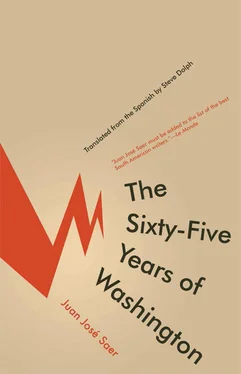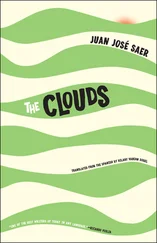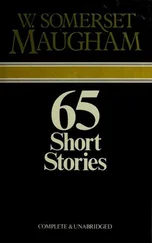Juan José Saer - The Sixty-Five Years of Washington
Здесь есть возможность читать онлайн «Juan José Saer - The Sixty-Five Years of Washington» весь текст электронной книги совершенно бесплатно (целиком полную версию без сокращений). В некоторых случаях можно слушать аудио, скачать через торрент в формате fb2 и присутствует краткое содержание. Год выпуска: 2010, Издательство: Open Letter, Жанр: Современная проза, на английском языке. Описание произведения, (предисловие) а так же отзывы посетителей доступны на портале библиотеки ЛибКат.
- Название:The Sixty-Five Years of Washington
- Автор:
- Издательство:Open Letter
- Жанр:
- Год:2010
- ISBN:нет данных
- Рейтинг книги:3 / 5. Голосов: 1
-
Избранное:Добавить в избранное
- Отзывы:
-
Ваша оценка:
- 60
- 1
- 2
- 3
- 4
- 5
The Sixty-Five Years of Washington: краткое содержание, описание и аннотация
Предлагаем к чтению аннотацию, описание, краткое содержание или предисловие (зависит от того, что написал сам автор книги «The Sixty-Five Years of Washington»). Если вы не нашли необходимую информацию о книге — напишите в комментариях, мы постараемся отыскать её.
The Sixty-Five Years of Washington — читать онлайн бесплатно полную книгу (весь текст) целиком
Ниже представлен текст книги, разбитый по страницам. Система сохранения места последней прочитанной страницы, позволяет с удобством читать онлайн бесплатно книгу «The Sixty-Five Years of Washington», без необходимости каждый раз заново искать на чём Вы остановились. Поставьте закладку, и сможете в любой момент перейти на страницу, на которой закончили чтение.
Интервал:
Закладка:
The insolent suicide , he thinks, discreetly watching the Mathematician, whose eyebrows indicate a laborious reflection that Leto cannot know, and is not interested in knowing, but which is more or less the following: Where does instinct come from? Does it belong to the individual or the species? Is there continuity between individuals? Does the latter individual take over the instinct from the point where the former left it or does he reconstruct, from zero, the whole process from the start? Is it substance, energy, reflex? What is our idea of instinct? How was it first formed? By whom? Where? As opposed to what? What, in a living thing, isn’t instinct? And then, forgetting Noca, Noca’s horse, instinct, the images he has built up thanks to Botón’s story on the ferry, the previous Saturday, on the upper deck, images of Washington’s birthday at Basso’s ranch, which he didn’t attend but will remember for the rest of his life, the other questions, always stirring, underground, and sometimes rising to the surface, suddenly, that follow us, form us, lead us, allow us to be, the old questions first brought up in the African dawn, heard in Babylon and asked again in Thebes, in Asia Minor, on the banks of the Yellow River, which sparkled in the Scandinavian snows, the soliloquy in Arabia, in New Guinea, in Königsberg, in Mato Grosso, and in Tenochtitlán, questions whose response is exaltation, is death, suffering, insanity, and which stir in every blink, every heartbeat, every premonition — who planted the seed of the world? what are the internal and the external? what are birth and death? is there a single object or many? what is the I? what is the general and the particular? what is repetition? what am I doing here? — that is to say, no? — the Mathematician, or someone else, somewhere else or at some other time, again, though there is only one, only one, which is always the same Place, and always, as we were saying, once and for all, the same Time.
For the twenty-seven seconds, give or take, that it took the Mathematician to refocus, silently, on his thoughts, and for Leto to remember, in quick, fragmented and disordered images what, as I was saying, I was saying just now, their bodies advance, in a regular way, down the narrow sidewalk, to the south. Neither of them notices that, without disruption, and without it being possible, with any clarity, to separate the two dimensions, they are advancing in time while doing so in space, as if every step they take moves them in opposite directions, inasmuch as time and space are inseparable and one is inconceivable without the other, and both inconceivable without each other, Leto and the Mathematician, the pedestrians, the street, and the morning form a thick current flowing calmly from the source of the event. Leto thinks (more or less, no?), For her to come along a year later with the story of an incurable illness just proves her inability to accept the transparency of his message —and you could add a comparison: with excessive, but for him necessary, means, like the physicists who build a tunnel several kilometers long where they shoot an infinitely small particle because the behavior of that particle will explain all matter and therefore the universe. And the Mathematician, walking alongside him, thinks again, Set in motion by , but says:
— Everyone was looking at Washington, who wasn’t saying anything.
Always according to Botón. Anyway, he wasn’t saying anything, but it seemed, from his pensive and half-smiling expression, his white eyes, the smoke of the Gitane Filtre (Caporal) rising to his face from his hand, which he held more or less at the height of his diaphragm, that he was about to say something. And in fact, he was. Leto imagines him at the head of the table, under the illuminated pavilion, close to the grill, the unforeseen pavilion installed hurriedly among the orange, grapefruit, and mandarin trees, in the dark patio, at the end of winter — Washington, the night of his sixty-fifth birthday, dressed warmly in his thermal undershirt and plaid wool shirt, plus a v-neck sweater with the shirt’s collar poking through the top, plus his wool blazer and over his shoulders maybe a poncho or a blanket, his white hair messy and thick, the skin on his face sagging a little but still firm, thick, clean-shaven, and healthy, one of those old men who, maybe because they work a farm, or go fishing, or often ride horses, or sit in the garden to read the paper during the siestas in winter, are tanned year-round, Washington, I was saying, while he forms, with a more and more pronounced smile in his eyes, which he keeps raising to his interlocutors, and a more and more vague smile on his lips, what he is about to say, shaping words, phrases, and gestures, he raises, parsimoniously, his cigarette to his lips and between puffs of smoke exhaled through his nose and mouth, begins to speak.
To Washington, if he has understood correctly, which is somewhat unlikely, as our friend Cohen’s subtlety in weighty questions is well-known, and he doesn’t even possess the rudiments that the university, spontaneously clearing any number of paths, supplies every student, not to mention the timely remunerations that, at the end of every month, help purge the spirit of material preoccupations that often disturb the progress of the syllogism, in short, if he understood correctly, the horse, having been declared an instinctive being, would be prohibited from stumbling, for the very reasons of instinct, which is considered pure necessity, while all of this is assumed only if you take the stumble, as our friend Barco clarified, in the sense of an error or mistake, not merely an accidental or external occurrence, but rather an internal contradiction in the horse, between the objects in question and the unexpected failure of the execution. Is he on track? Does the absence of an objection authorize him to continue? Yes? Alright, he will continue.
And so on. He, Washington, no? thought he understood the issue. Here, ostentatiously, almost paternally, the Mathematician grabs Leto by the left arm, to protect him from the aggression of a car that’s coming down the cross street, driving threateningly from the previous block, where it had accelerated, after crossing the intersection, according to the habitual system of motor vehicle conduction in rectangular cities: brakes and deceleration before the corner, accelerator after the intersection, reduction of speed midway down the block, and so on successively, which gives the system, bearing in mind that the length of the blocks is more or less constant and despite its contradictory principles, a highly regular nature. Over Leto’s head the Mathematician, in one second, analyzes the facts gathered by a glance that scrutinizes the cross street to the west: the cars appear well-adapted to the brakes/accelerator system, and the three approaching at the crossing with San Martín, one behind the other, judging by the unvarying distance that separates them in spite of the decreasing velocity of the first, appeared set, if they maintained the rate of reduction, to stop and allow the cars arriving perpendicularly down San Martín and the pedestrians crossing the intersection to pass, so that the Mathematician, decisive, drags Leto by the arm, making him stumble when they cross the cable guardrail into the street and forcing him to increase the extension and speed of his steps while they cross, and you could say that the Mathematician, who hasn’t for an instant stopped watching, by turns, the cars coming down the cross street, the ones that could turn sharply from San Martín, and the cable guardrail they are walking toward, until he feels released from his responsibility after they cross the guardrail, does not let go of Leto’s arm or continue his story before verifying that they can walk safely down the sidewalk. Then he goes on: as Botón has it, Washington, in the first part of his interjection, does not pose a single objection to Cohen or Barco’s propositions — furthermore, they seem pertinent to him and he appears to understand the point of view they presuppose. The only thing he finds objectionable, for the clarity of problem, is the selection of the horse as the object of analysis. In his modest opinion, one can handily discard the horse for several reasons. First off, the horse is too close to people (to whom he concedes, without major theoretical obstacles, the ability to stumble), which pollutes the rationale with anthropocentric contaminants, not to mention that the proximity between horses and people has caused every class of symbolic projection to be deposited on the poor animal, to such an extent that, under so many symbolic layers, it is difficult to know where to find the real horse. Likewise, we pretend to know so many things about the horse — we think that it’s strong, that it’s loyal, that it’s noble, that it’s tough, that it’s nervous, that it loves the pampa , and that it’s greatest ambition is to win the Carlos Pellegrini prize. We’re convinced that if it got into politics it would be nationalist, and that if it talked, it would sound like old Vizcacha. To top it off, says the Mathematician that Botón said that Washington said, because of its more or less pre-eminent position on the zoological ladder, the horse possesses an excessive biological and ontological density: it has too much flesh, too much blood, too many bones, too many nerves, and in spite of its elusive gaze, less indiscreet than the cow’s, we can conceive of its presence in this world as not exempt from necessity, in such a way that, through metaphysical negligence, to which not a few thinkers have succumbed, one could even allow an existential category that included both horses and people — in short, if he has understood correctly, what you could say in relation to Noca’s horse, which is certainly nothing but a pretext for the discussion, you would have to apply to another being, more differentiated from people than horses, a member of a species of living beings of course, but whose identity, inconsequential but irrefutable, is less disposed to misrepresentation. The mosquito, for example.
Читать дальшеИнтервал:
Закладка:
Похожие книги на «The Sixty-Five Years of Washington»
Представляем Вашему вниманию похожие книги на «The Sixty-Five Years of Washington» списком для выбора. Мы отобрали схожую по названию и смыслу литературу в надежде предоставить читателям больше вариантов отыскать новые, интересные, ещё непрочитанные произведения.
Обсуждение, отзывы о книге «The Sixty-Five Years of Washington» и просто собственные мнения читателей. Оставьте ваши комментарии, напишите, что Вы думаете о произведении, его смысле или главных героях. Укажите что конкретно понравилось, а что нет, и почему Вы так считаете.












